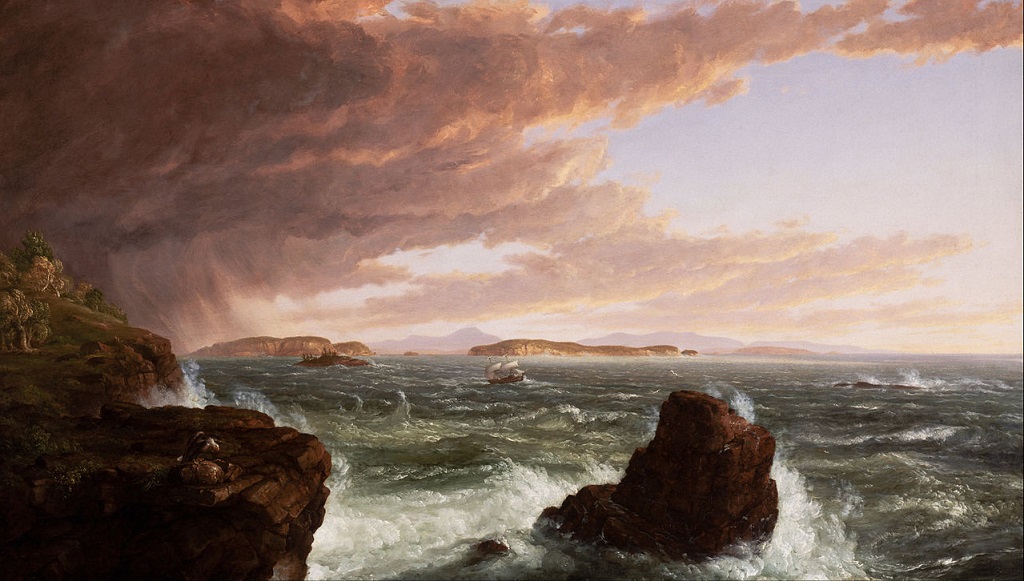In Frenchman bay, near Otter Point, the sea
Against an ancient rock comes crashing down.
This grey-clad cliff protrudes its stony knee
Into the swirling surf, with horny crown.
Sometimes the thundering waves foam violently
Atop this shelf, its face to thus obscure.
Sometimes the water withdraws most reverently
And gathers ‘round its base, still and pure.
Now look! The rolling waves, the ebbing tide,
The storm-stirred, frothing seas at dead of night,
The undercurrent, drawing all aside.
Each one assaults the rock with all his might.
Unchanged, the rock retains its stalwart perch.
There’s light upon the rock for those who search.
Poet’s Note: Inspired by Psalm 18:2, Psalm 18:31, Deuteronomy 32:3-4, and 1 Peter 2:4
Nathaniel McKee’s interest in classical poetry first grew while studying for a master’s in business administration at the University of Oxford, UK. Somehow this whimsical place deepened an already strong appreciation for the humanities, even as he studied business. He currently purchases agricultural commodities and energy for a mid-sized food manufacturing company in the foothills of southeastern Tennessee, USA, where he lives with his wife, Bethany, and newborn son, Henry.















Beautiful imagery and cadence. It was a refreshing way to begin my day—reading this work. A message we all need. Well done.
Thank you, Jordan!
I like your poem. The last line seems to refer to this Bible verse:
Then Jesus again spoke to them, saying, “I am the Light of the world; he who follows Me will not walk in the darkness, but will have the Light of life.” (John 8:12, NASB)
However,
No wonder, for even Satan disguises himself as an angel of light. (2 Corinthians 11:14, NASB)
“The eye is the lamp of the body; so then if your eye is clear, your whole body will be full of light. But if your eye is bad, your whole body will be full of darkness. If then the light that is in you is darkness, how great is the darkness!” (Matthew 6:23-24, NASB)
How do we know the good light from the bad light? I believe it takes spiritual discernment.
Your poem also seems to refer to these verses:
But the wicked are like the tossing sea,
For it cannot be quiet,
And its waters toss up refuse and mud.
“There is no peace,” says my God, “for the wicked.”
(Isaiah 57:20-21, NASB)
In contrast to the “tossing sea,” the “rock” is unchanged and unchanging.
I also like how “horny crown” rhymes with “thorny crown” in your poem (yet another Bible reference).
“Each one assaults the rock with all his might.” I wonder whether you should change “his” to “its,” since you use “its” in the rest of the poem to refer to (in)animate objects. Or does “his” refer to people?
Alan, thanks for reading and sharing the additional Bible verses and suggestion. I debated with “its” vs “his” while writing and went with “his,” partly to avoid confusion between those assaulting and the rock itself, partly to add a little personification to those forces.
Just one more verse. The two lines below brought to mind a verse from Isaiah, which you probably did not intend to allude to, but perhaps you did.
“Sometimes the thundering waves foam violently
Atop this shelf, its face to thus obscure.”
(Or, “Atop this shelf, to make its face obscure.” — to avoid the inversion.)
Just as many were astonished at you, My people,
So His appearance was marred more than any man
And His form more than the sons of men.
(Isaiah 52:14, NASB)
Lovely, Nathaniel, both the metaphor and the message.
My suggestion would be to remove the “most” from the third line of the second stanza of this sonnet: “Sometimes the water withdraws most reverently” in order to keep the meter a bit more in check. Even better would be to replace “withdraws most” with a two syllable word, such as “quiets.”
Since the next line, “And gathers ‘round its base, still and pure” is short a syllable, which makes us pause after “base,” you could add a “so” in front of “still,” which would keep the meter completely even and smooth.
Feel free to keep the poem as is, but I think reading
“Sometimes the water quiets reverently,
And gathers ’round its base, so still and pure.” would keep the poem rolling along without a hiccup.
Thanks for reading, Amy, and for the suggestions.
Beautiful imagery Nathan. I could picture the rocks, waves and undulating ebb and flow of the tides.
Thank you!
If Frenchman bay is the proper name of a place, spell it Frenchman Bay, with a capital B.
In the first quatrain, change “horny” to something else — perhaps “rigid” or “ragged”.
Amy Foreman’s suggestions are right on the mark.
Thanks for the comments, Joseph. However, I don’t believe rigid or ragged capture the image in quite the same way.
A comment on the request to change “sometimes the water withdraws most reverently.” See two lines earlier for that which this beat is supposed to mirror, “sometimes the thundering waves foam violently.” Changing to a strict lambic meter would take this away.
Alternatively, you could amend the antecedent line as well. It all depends on how faithful you want to be to accurate measurement.
Thanks for reading and for the comments, Mr. Anderson. If keeping each line in strict x / x / x / x / x / is what constitutes “accurate measurement”, as you and the others seem to suggest, then I believe breaking it is perfectly acceptable as long as there is a good reason to do so, the five strong beats remain, and the audience can catch the beat. Paradise Lost would be a duller read without Milton’s variations from the standard iambic line.